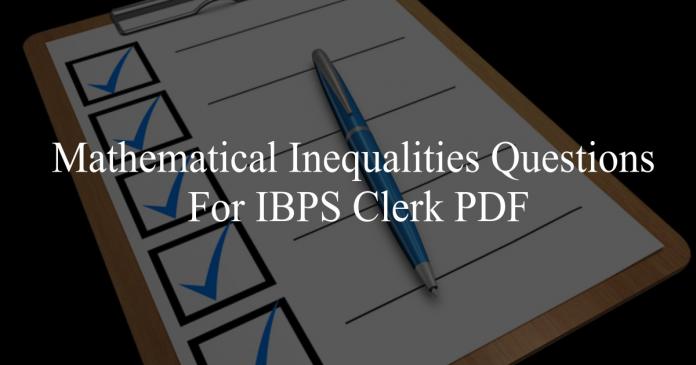Mathematical Inequalities Questions For IBPS Clerk
Download important Mathematical Iequalities PDF based on previously asked questions in IBPS Clerk and other Banking Exams. Practice Mathematical Inequalities for IBPS Clerk Exam.
Download Mathematical Inequalities Questions For IBPS Clerk
Get 25 IBPS Clerk mocks for Rs. 149. Enroll here
Take Free IBPS Clerk Mock Test
Download IBPS Clerk Previous papers PDF
Go to Free Banking Study Material (15,000 Solved Questions)
Instructions
In the following questions two equations numbered I and II are given. You have to solve both the equations and
Give answer a: if x > y
Give answer b: if x ≥ y
Give answer c: if x < y
Give answer d: if x ≤ y
Give answer e: if x = y or the relationship cannot be established.
Question 1: I. $x^{2}-3x-88=0$
II. $y^{2}+8y-48=0$
a) if x > y
b) if x ≥ y
c) if x < y
d) if x ≤ y
e) if x = y or the relationship cannot be established.
Question 2: I. $5x^{2}+29x+20=0$
II. $25y^{2}+25y+6=0$
a) if x > y
b) if x ≥ y
c) if x < y
d) if x ≤ y
e) if x = y or the relationship cannot be established.
Question 3: I. $2x^{2}-11x+12=0$
II. $2y^{2}-19y+44=0$
a) if x > y
b) if x ≥ y
c) if x < y
d) if x ≤ y
e) if x = y or the relationship cannot be established.
Question 4: I. $3x^{2}+10x+8=0$
II. $3y^{2}+7y+4=0$
a) if x > y
b) if x ≥ y
c) if x < y
d) if x ≤ y
e) if x = y or the relationship cannot be established.
Question 5: I. $2x^{2}+21x+10=0$
II. $3y^{2}+13y+14=0$
a) if x > y
b) if x ≥ y
c) if x < y
d) if x ≤ y
e) if x = y or the relationship cannot be established.
Instructions
In each of these questions two equations numbered I and II are given. You have to solve both the equations and –
Give answer a: if x < y
Give answer b: if x ≤ y
Give answer c: if x > y
Give answer d: if x ≥ y
Give answer e: if x = y or the relationship cannot be established.
Question 6: I. $x^{2}+13x+42=0$
II. $y^{2} +19y+90=0$
a) if x < y
b) if x ≤ y
c) if x > y
d) if x ≥ y
e) if x = y or the relationship cannot be established.
Question 7: I. $x^{2}-15x+56=0$
II. $y^{2} -23y+132=0$
a) if x < y
b) if x ≤ y
c) if x > y
d) if x ≥ y
e) if x = y or the relationship cannot be established.
Question 8: I. $x^{2}+7x+12=0$
II. $y^{2} +6y+8=0$
a) if x < y
b) if x ≤ y
c) if x > y
d) if x ≥ y
e) if x = y or the relationship cannot be established.
Question 9: I. $x^{2}-22x+120=0$
II. $y^{2} -26y+168=0$
a) if x < y
b) if x ≤ y
c) if x > y
d) if x ≥ y
e) if x = y or the relationship cannot be established.
IBPS Clerk Important Questions PDF
Free Banking Study Material (15,000 Solved Questions)
Question 10: I.$x^{2}+12x+32=0$
II. $y^{2} +17y+72=0$
a) if x < y
b) if x ≤ y
c) if x > y
d) if x ≥ y
e) if x = y or the relationship cannot be established.
Instructions
In each of the following questions, two equations I and II have been given.
Solve these questions and answer
(1)if x < y
(2) if x ≤ y
(3) if x = y or the relation cannot be established
(4) if ≥ y
(5) if x > y
Question 11: I. $30 x^{2} + 11x + 1 = 0$
II. $42 y^{2} + 13y + 1 = 0$
a) if x < y
b) if x ≤ y
c) if x = y or the relation cannot be established
d) if ≥ y
e) if x > y
Question 12: I. $x^{2}- x – \sqrt{2}x + \sqrt{2}=0$
II.$y^{2}-3y+2=0$
a) if x < y
b) if x ≤ y
c) if x = y or the relation cannot be established
d) if ≥ y
e) if x > y
Question 13: I.$x^{2}-2x-\sqrt{5}x+2\sqrt{5}=0$
II.$y^{2}-\sqrt{3}y-\sqrt{2}y+\sqrt{6}=0$
a) if x < y
b) if x ≤ y
c) if x = y or the relation cannot be established
d) if ≥ y
e) if x > y
Question 14: I.$ x^{2}+12x+36=0$
II.$y^{2}=16$
a) if x < y
b) if x ≤ y
c) if x = y or the relation cannot be established
d) if ≥ y
e) if x > y
Question 15: I.$9x^{2}+3x-2=0$
II.$8y^{2}+6y+1=0$
a) if x < y
b) if x ≤ y
c) if x = y or the relation cannot be established
d) if ≥ y
e) if x > y
Daily Free Banking Online Tests
Answers & Solutions:
1) Answer (E)
I.$x^{2} – 3x – 88 = 0$
=> $x^2 + 8x – 11x – 88 = 0$
=> $x (x + 8) – 11 (x + 8) = 0$
=> $(x + 8) (x – 11) = 0$
=> $x = -8 , 11$
II.$y^{2} + 8y – 48 = 0$
=> $y^2 + 12y – 4y – 48 = 0$
=> $y (y + 12) – 4 (y + 12) = 0$
=> $(y + 12) (y – 4) = 0$
=> $y = -12 , 4$
$\therefore$ No relation can be established.
2) Answer (C)
I.$5x^{2} + 29x + 20 = 0$
=> $5x^2 + 25x + 4x + 20 = 0$
=> $5x (x + 5) + 4 (x + 5) = 0$
=> $(x + 5) (5x + 4) = 0$
=> $x = -5 , \frac{-4}{5}$
II.$25y^{2} + 25y + 6 = 0$
=> $25y^2 + 10y + 15y + 6 = 0$
=> $5y (5y + 2) + 3 (5y + 2) = 0$
=> $(5y + 3) (5y + 2) = 0$
=> $y = \frac{-3}{5} , \frac{-2}{5}$
Therefore $x < y$
3) Answer (D)
I.$2x^{2} – 11x + 12 = 0$
=> $2x^2 – 8x – 3x + 12 = 0$
=> $2x (x – 4) – 3 (x – 4) = 0$
=> $(x – 4) (2x – 3) = 0$
=> $x = 4 , \frac{3}{2}$
II.$2y^{2} – 19y + 44 = 0$
=> $2y^2 – 8y – 11y + 44 = 0$
=> $2y (y – 4) – 11 (y – 4) = 0$
=> $(y – 4) (2y – 11) = 0$
=> $y = 4 , \frac{11}{2}$
$\therefore x \leq y$
4) Answer (D)
I.$3x^{2} + 10x + 8 = 0$
=> $3x^2 + 6x + 4x + 8 = 0$
=> $3x (x + 2) + 4 (x + 2) = 0$
=> $(x + 2) (3x + 4) = 0$
=> $x = -2 , \frac{-4}{3}$
II.$3y^{2} + 7y + 4 = 0$
=> $3y^2 + 3y + 4y + 4 = 0$
=> $3y (y + 1) + 4 (y + 1) = 0$
=> $(y + 1) (3y + 4) = 0$
=> $y = -1 , \frac{-4}{3}$
$\therefore x \leq y$
5) Answer (E)
I.$2x^{2} + 21x + 10 = 0$
=> $2x^2 + x + 20x + 10 = 0$
=> $x (2x + 1) + 10 (2x + 1) = 0$
=> $(x + 10) (2x + 1) = 0$
=> $x = -10 , \frac{-1}{2}$
II.$3y^{2} + 13y + 14 = 0$
=> $3y^2 + 6y + 7y + 14 = 0$
=> $3y (y + 2) + 7 (y + 2) = 0$
=> $(y + 2) (3y + 7) = 0$
=> $y = -2 , \frac{-7}{3}$
$\therefore$ No relation can be established.
6) Answer (C)
I.$x^{2} + 13x + 42 = 0$
=> $x^2 + 7x + 6x + 42 = 0$
=> $x (x + 7) + 6 (x + 7) = 0$
=> $(x + 7) (x + 6) = 0$
=> $x = -7 , -6$
II.$y^{2} + 19y + 90 = 0$
=> $y^2 + 9y + 10y + 90 = 0$
=> $y (y + 9) + 10 (y + 9) = 0$
=> $(y + 9) (y + 10) = 0$
=> $y = -9 , -10$
$\therefore x > y$
7) Answer (A)
I.$x^{2} – 15x + 56 = 0$
=> $x^2 – 8x – 7x + 56 = 0$
=> $x (x – 8) – 7 (x – 8) = 0$
=> $(x – 8) (x – 7) = 0$
=> $x = 8 , 7$
II.$y^{2} – 23y + 132 = 0$
=> $y^2 – 11y – 12y + 132 = 0$
=> $y (y – 11) – 12 (y – 11) = 0$
=> $(y – 11) (y – 12) = 0$
=> $y = 11 , 12$
$\therefore x < y$
8) Answer (E)
I.$x^{2} + 7x + 12 = 0$
=> $x^2 + 3x + 4x + 12 = 0$
=> $x (x + 3) + 4 (x + 3) = 0$
=> $(x + 3) (x + 4) = 0$
=> $x = -3 , -4$
II.$y^{2} + 6y + 8 = 0$
=> $y^2 + 4y + 2y + 8 = 0$
=> $y (y + 4) + 2 (y + 4) = 0$
=> $(y + 4) (y + 2) = 0$
=> $y = -4 , -2$
Because $-2 > -4$ and $-3 > -4$
Therefore, no relation can be established.
9) Answer (B)
I.$x^{2} – 22x + 120 = 0$
=> $x^2 – 10x – 12x + 120 = 0$
=> $x (x – 10) – 12 (x – 10) = 0$
=> $(x – 10) (x – 12) = 0$
=> $x = 10 , 12$
II.$y^{2} – 26y + 168 = 0$
=> $y^2 – 12y – 14y + 168 = 0$
=> $y (y – 12) – 14 (y – 12) = 0$
=> $(y – 12) (y – 14) = 0$
=> $y = 12 , 14$
$\therefore x \leq y$
10) Answer (D)
I.$x^{2} + 12x + 32 = 0$
=> $x^2 + 8x + 4x + 32 = 0$
=> $x (x + 8) + 4 (x + 8) = 0$
=> $(x + 8) (x + 4) = 0$
=> $x = -8 , -4$
II.$y^{2} + 17y + 72 = 0$
=> $y^2 + 9y + 8y + 72 = 0$
=> $y (y + 9) + 8 (y + 9) = 0$
=> $(y + 9) (y + 8) = 0$
=> $y = -9 , -8$
$\therefore x \geq y$
Get 25 IBPS Clerk mocks for Rs. 149. Enroll here
11) Answer (B)
Statement I : $30 x^{2} + 11x + 1 = 0$
=> $30x^2 + 6x + 5x + 1 = 0$
=> $6x (5x + 1) + 1 (5x + 1) = 0$
=> $(6x + 1) (5x + 1) = 0$
=> $x = \frac{-1}{6} , \frac{-1}{5}$
Statement II : $42 y^{2} + 13y + 1 = 0$
=> $42y^2 + 7y + 6y + 1 = 0$
=> $7y (6y + 1) + 1 (6y + 1) = 0$
=> $(7y + 1) (6y + 1) = 0$
=> $y = \frac{-1}{7} , \frac{-1}{6}$
$\therefore$ $x \leq y$
12) Answer (C)
I. $x^{2}- x – \sqrt{2}x + \sqrt{2}=0$
=> $x (x – 1) – \sqrt{2} (x – 1) = 0$
=> $(x – \sqrt{2}) (x – 1) = 0$
=> $x = \sqrt{2} , 1$
II. $y^{2}-3y+2=0$
=> $y^2 – 2y – y + 2 = 0$
=> $y (y – 2) – 1 (y – 2) = 0$
=> $(y – 2) (y – 1) = 0$
=> $y = 1 , 2$
$\therefore$ No relation established.
13) Answer (E)
Statement I : $x^{2}-2x-\sqrt{5}x+2\sqrt{5}=0$
=> $x (x – 2) – \sqrt{5} (x – 2) = 0$
=> $(x – \sqrt{5}) (x – 2) = 0$
=> $x = \sqrt{5} , 2$
Statement II : $y^{2}-\sqrt{3}y-\sqrt{2}y+\sqrt{6}=0$
=> $y (y – \sqrt{3}) – \sqrt{2} (y – \sqrt{3}) = 0$
=> $(y – \sqrt{2}) (y – \sqrt{3}) = 0$
=> $y = \sqrt{2} , \sqrt{3}$
$\therefore$ $x > y$
14) Answer (A)
Statement 1 : $x^2 + 12x + 36 = 0$
=> $x^2 + 2.x.6 + 6^2 = 0$
=> $(x + 6)^2 = 0$
=> $x = -6$
Statement II : $y^2 = 16$
=> $(y)^2 = (\pm 4)^2$
=> $y = \pm 4$
$\therefore$ $x < y$
15) Answer (C)
Statement I : $9x^{2}+3x-2=0$
=> $9x^2 + 6x – 3x – 2 = 0$
=> $3x (3x + 2) – 1 (3x + 2) = 0$
=> $(3x – 1) (3x + 2) = 0$
=> $x = \frac{1}{3} , \frac{-2}{3}$
Statement II : $8y^{2}+6y+1=0$
=> $8y^2 + 4y + 2y + 1 = 0$
=> $4y (2y + 1) + 1 (2y + 1) = 0$
=> $(4y + 1) (2y + 1) = 0$
=> $y = \frac{-1}{4} , \frac{-1}{2}$
$\therefore$ No relation can be established.
Highly Rated Free Preparation App for Banking Exams
We hope this Mathematics Inequalities for IBPS Clerk preparation will be helpful to you.





